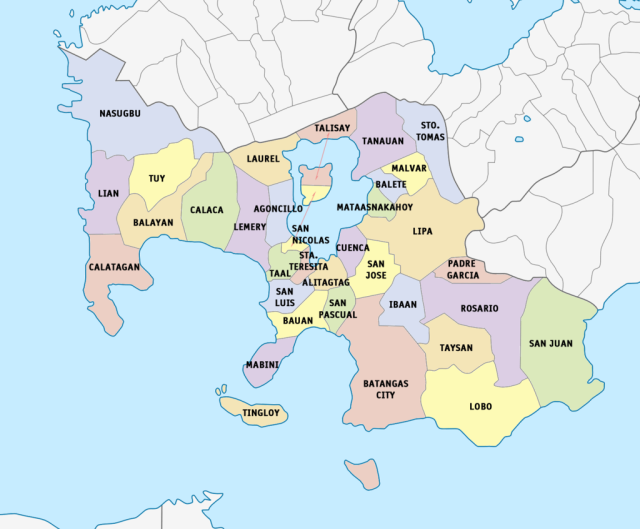
This is the continuation of the article that appeared on Pacific Paratrooper’s blog about my parent’s escape from the Japanese when the American soldiers landed in Batangas in 1945. If you have not read it yet, I advise you to go to Pacific Paratrooper’s blog first before you continue reading this article. Thanks.
My father was uncomfortable staying in Alitagtag because where they were hiding was not that far from the main road. It was only a mile away even though it was wooded and close to a ditch. Dad decided to take a chance and leave Alitagtag. After dark, they joined another group and moved to another location south of the main road somewhere near Bauan where my mom’s family lived. Some of the townspeople were moving to farms farther south away from the main road.
They decided to leave after dark. Dad made a papoose bag and carried me in it. Mom grabbed some clothes for us and a scarf to cover her head. They thought it would be safer where they were going because the Japanese camp was so close to Alitagtag and the Japanese might advance to Alitagtag and meet the Americans head on. Dad’s two younger brothers joined them. They left under the cover of darkness.
As they passed the main road, they looked all around them to see if there was anyone in sight. Nobody was around. They safely crossed the main road, went quietly through people’s yards and began their trek. It was total darkness and not a sound could be heard except their footsteps. As they reached the farm beyond the houses, there was a faint glow from the moon above. They walked at a very fast pace. Dad was leading the group as they followed a trail he knew. They headed south passing through farmland. They reached a small rise then turned east towards the place where two big mango trees, a local landmark, were and turned south again. Every so often, they would stop and listened for strange sounds. When they thought it was not a Japanese patrol, they kept their steady pace. The quiet of the field was only broken by sounds from the night owl and bats roaming the night. They kept on looking back but could not see a thing.
They veered left through another path which would take them to Bauan. This time, the moon disappeared behind the cloud. Everything around them went pitch black. They slowed down their trek, trying to listen to any noise or movement. They had to be alert to any possible danger. They found a clearing and rested for a while. They might have dozed for an hour. Then they saw the moon begin peeking through the clouds again. They decided to move on. They kept on walking that seemed like forever. They reached Bauan as the dawn was coming up.
They went straight to their Ninong sa Kasal’s (wedding sponsor) house near Bauan town market. The town was still quiet. Not a soul was up yet. They knocked at the door. The mayordomo opened the door. Dad asked if his godfather was home but was told he left with his family for Mindoro where it’s safe.
“I’m not sure it’s safe anywhere anymore. The Japanese are killing civilians now, not just soldiers and guerillas. Are you staying here?” Dad asked. The old man told Dad they were leaving town soon and would go into hiding.
“I think you should leave now and go to some remote barrio where the Japanese do not venture at all,” Dad told the mayordomo.
Dad decided to move on and find my mother’s family. They went to Asis, a small barrio between Alitagtag and Bauan far from the main road where my maternal grandmother and uncles were hiding. My maternal grandfather died when Mom was five years old.
They were only at Asis a few days when they noticed a black cloud coming from the west. From where they stood, they could not see the flame but it was definitely a big fire. They saw black smoke shooting up to the sky coupled with bright light on the horizon. They had the suspicion that the Japanese started burning some areas. Dad was worried about his parents who were hiding in Alitagtag. He hoped the fire was not there. Mom thought of her aunt and her aunt’s family who were hiding near Taal at a sugar cane field.
Dad told Mom he had to go back to Alitagtag to make sure his parents were OK.
“What about your brothers?” She asked.
“They are staying with you and the baby. You’ll all be safe here. Take care of the baby in case I don’t come back.”
Dad walked back to Alitagtag. He followed the same path he did a few nights before. It took him all day. He could smell the smoke as he was getting closer to the main road in Alitagtag but it looked like it was coming from the northwest of where his parents were. The air was gray with smoke. He crossed the main road and it was empty. Nobody was around. Looking right and left, he ran across the street beyond the houses and into the fields. So far he had not encountered any Japanese soldier.
He reached the area where his parents were hiding. His parents were glad to see him. He found out everything was fine there except the Japanese started burning the villages from Muzon about two kilometers from where they were all the way to Taal in retaliation for their losses in Muzon.

Apparently, the Philippine guerillas in Batangas, a ferocious looking group of Batanguenos, ran into a group of Japanese soldiers a few days ago. A fierce skirmish with the Japanese soldiers ensued at the junction of Alitagtag and Muzon. The fight ended with some Japanese casualties. The Japanese thought the revolutionaries came from Taal so they set fire to all the houses from Muzon all the way to Taal.
As the fire started to spread out, people near Taal did not think it would reach them since it started too far from where they were. But as the fire spread through several villages, people who were still in their home started scrambling and ran for their lives. They went running to the sugar cane fields away from the main road. They joined some villagers who were already hiding there. But the Japanese made sure they burned the whole perimeter of all sugar cane fields including those which dotted the roadways to Taal so people had no way of escaping. They were trapped.
My grandfather told Dad to go back to Bauan and bring back his family to Alitagtag. So the next day, Dad was back on the dirt path going back to Asis to take his family back to Alitagtag. However, Mom insisted on staying for a few more weeks till everything calm down. They stayed for a couple of months until they got word that Alitagtag was now safe.
After large-scale enemy resistance in southern Luzon had collapsed, the Japanese in Batangas unleashed their brutal campaign of torture, rape and butchery against the Filipino civilians. Groups of men were rounded up and sent to a building and then the building was doused with kerosene and burned. Thousands of residents were massacred both in Lipa City and in Bauan. One of Mom’s relatives went to one of the so called “meetings” in Bauan where people were locked up in a schoolroom and then the building was doused with kerosene and set on fire. He died in that massacre.
Alitagtag was lucky to be spared the wrath of the Japanese because rumor was the Mayor was a Japanese sympathizer. Behind their back, he was also working for the Americans giving them intelligence report on where the Japanese were. There was a saying around that time, “Pilipino Tagu, Pilipino Turu” meaning Pilipino hides then Pilipino points in the other direction”. The mayor was playing both fields thereby gaining good graces from both parties.
Thanks for reading this article. My parents survived the war. Mom is still alive at 95. Dad passed away in 2007. The story was related to me by my father on their last visit to the United States before Dad died.
Rosalinda

Reblogged this on Subli.
LikeLike
Thank you for continuing the story.
LikeLiked by 1 person
You’re welcome and thanks to you for posting the first part.
LikeLiked by 1 person
Thank you so much for sharing your family’s story. What a terrifying time 😦
LikeLiked by 1 person
You’re welcome. Some accounts of the war are not in the history books. This gives people a new perspective on what really happened.
LikeLiked by 1 person
While researching to find any monument in the P.I. for the mules and horses that fought in the war, I found this article you might find interesting to read.
https://thewesterner.blogspot.com/2016/02/mules-macarthur-and-monuments.html
LikeLike
Thanks. I’ll check it out. In the book I’m reading, there was a monument in Corregidor that listed all the battles of the Pacific War except one, The Battle of Manila. It said it was approved by MacArthur. Whether true or not, I have no idea. I have to look that up if I ever get back home.
LikeLike
I’ve done quite a bit of researching on Japanese atrocities in Batangas in WWII, but this is the first time I’ve read of the “meetings.” Learn something new each day!
Fascinating read! Thank.
Rex
http://www.batangashistory.date/
LikeLiked by 1 person
I got your e-mail from Batangas History, can’t reply as the e-mail ad was cloaked. Thanks for dropping by, too! I will definitely check out your books. About the ads, much as I would like to get rid of them they do help to pay for the domain name. Cheers!
LikeLiked by 1 person
Rex, I do understand. My suggestion was based on things I read about ads. Most people say it does not pay enough for all the readers they lose. I do have ads on some of my sites. I took some out for that reason. I suppose you are from Batangas. Dad was from Alitagtag and Mom was from Bauan and I grew up in Alitagtag till I went to college in 1959. I was the valedictorian Class of ’59 at Alitagtag High School.
LikeLiked by 1 person